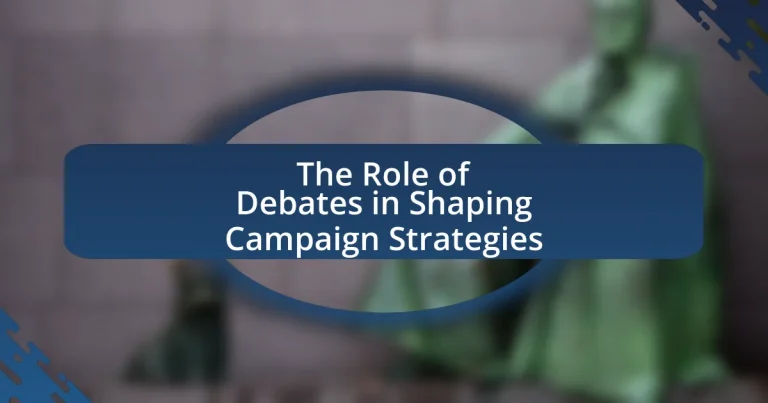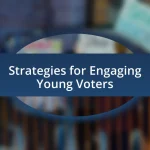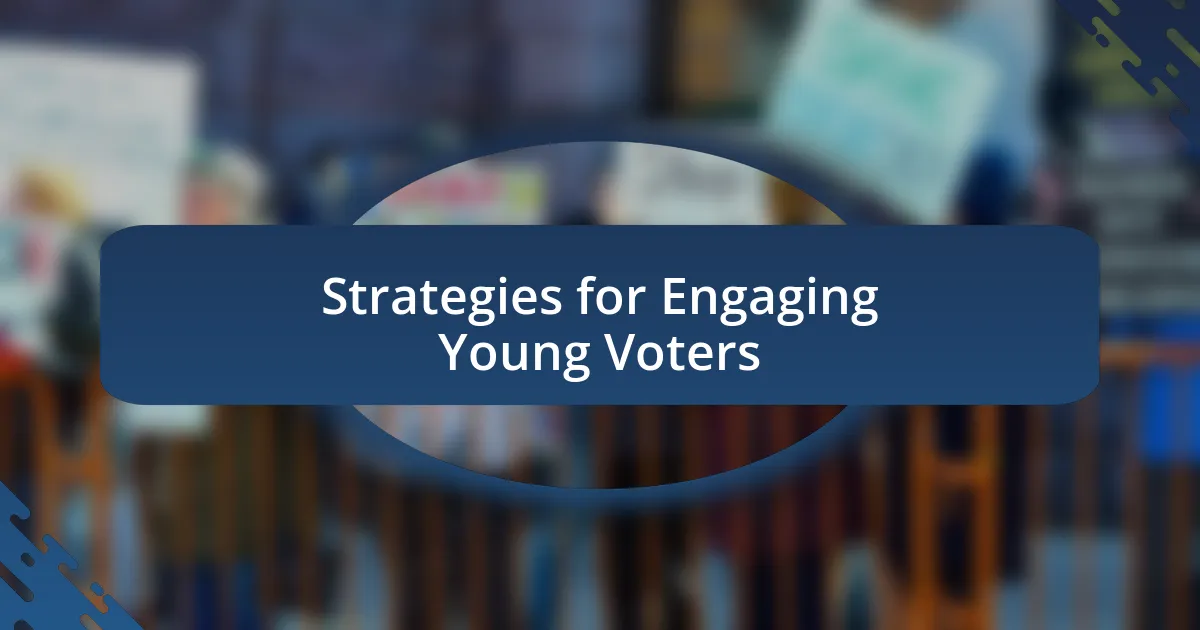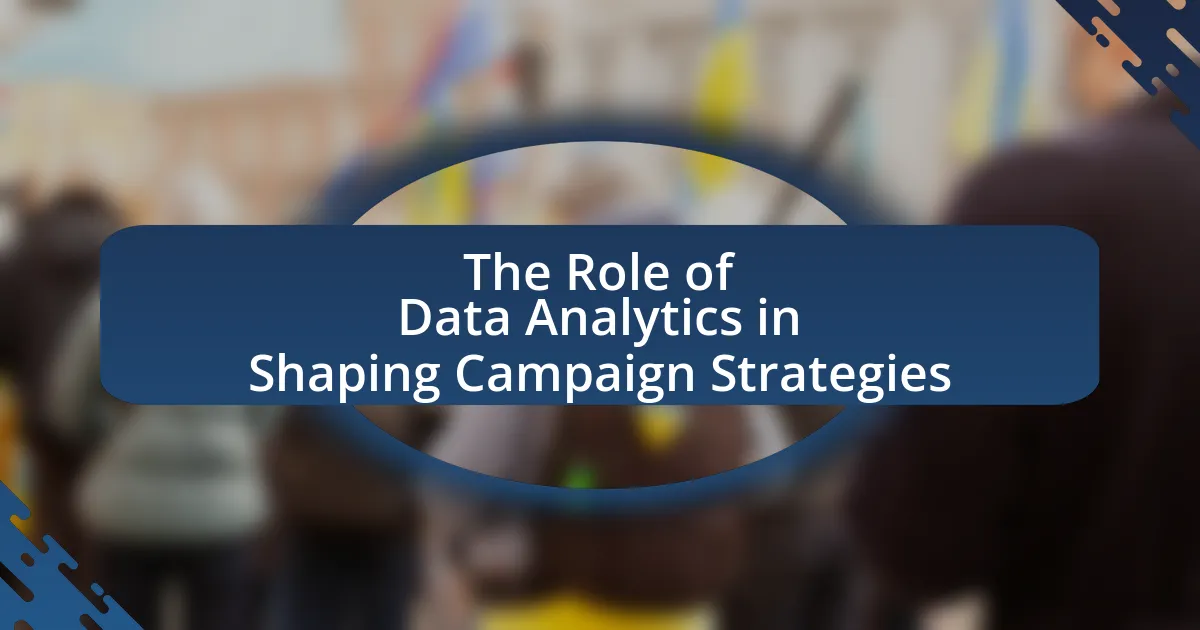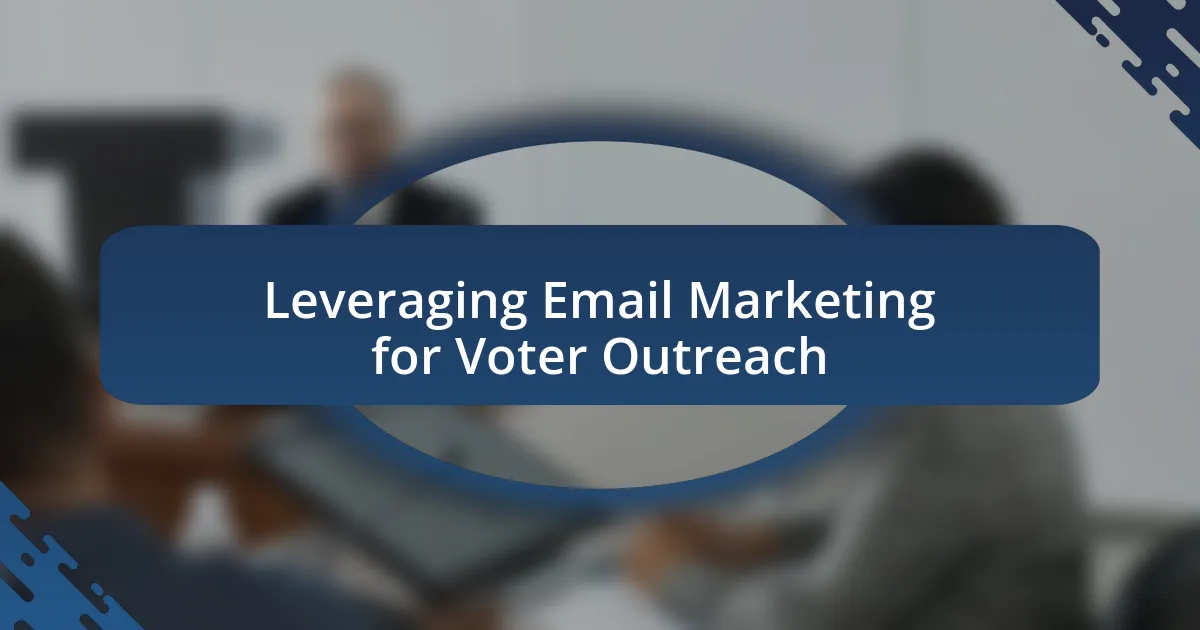The article examines the critical role of debates in shaping campaign strategies, highlighting how they provide candidates with a platform to articulate policies, engage with opponents, and connect with voters. It discusses the influence of debates on public perception, the factors contributing to their effectiveness, and the preparation strategies candidates employ to maximize their impact. Additionally, the article explores the various types of debate formats, the role of moderators, and the psychological effects on voters, particularly undecided ones. Historical examples illustrate the significance of debates in elections, while the article also addresses how candidates can leverage debate performances to enhance their campaign messaging and recover from poor performances.
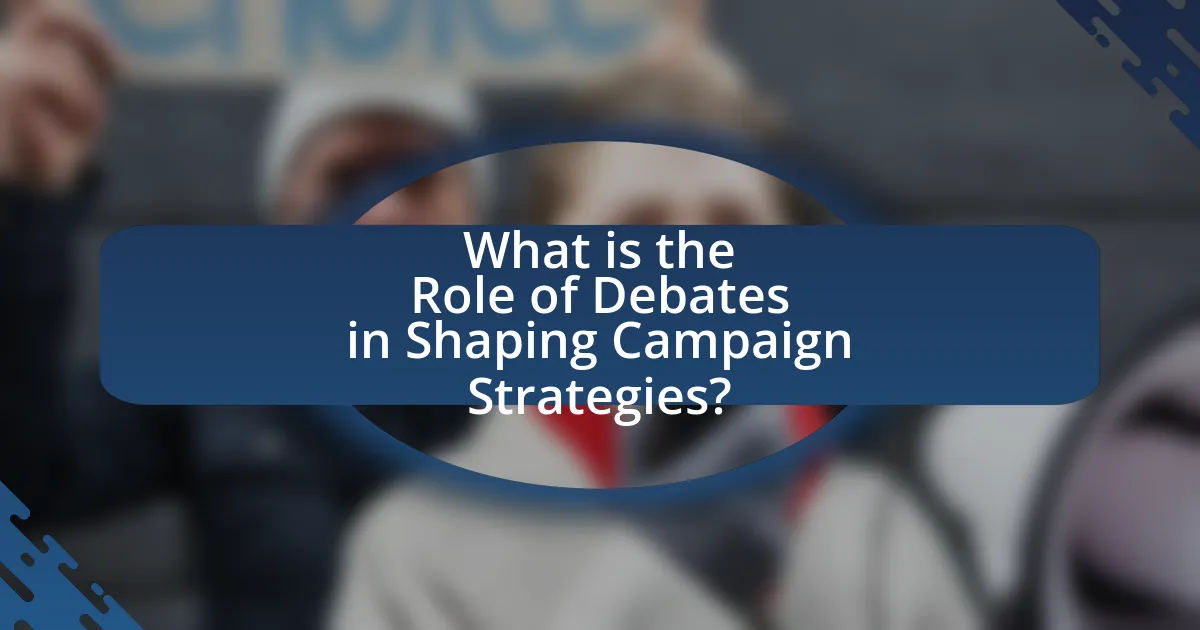
What is the Role of Debates in Shaping Campaign Strategies?
Debates play a crucial role in shaping campaign strategies by providing candidates with a platform to articulate their policies, engage with opponents, and connect with voters. Through debates, candidates can highlight their strengths and differentiate themselves from their rivals, influencing public perception and voter decision-making. For instance, the 1984 presidential debate between Ronald Reagan and Walter Mondale showcased Reagan’s communication skills, which significantly bolstered his campaign strategy and public image. Additionally, debates often serve as a barometer for public opinion, prompting candidates to adjust their strategies based on audience reactions and media coverage. This dynamic interaction between candidates and voters during debates can lead to shifts in campaign focus and messaging, ultimately impacting election outcomes.
How do debates influence public perception during campaigns?
Debates significantly influence public perception during campaigns by providing a platform for candidates to present their policies and engage directly with opponents. This direct interaction allows voters to assess candidates’ communication skills, knowledge, and temperament, which can sway opinions. For instance, a study by the Pew Research Center found that 67% of debate viewers reported that the debates helped them form opinions about the candidates. Additionally, memorable moments or gaffes during debates can become focal points in media coverage, further shaping public perception. Thus, debates serve as critical events that can enhance or diminish a candidate’s image in the eyes of the electorate.
What factors contribute to the effectiveness of debates in shaping opinions?
The effectiveness of debates in shaping opinions is primarily influenced by the clarity of arguments presented, the credibility of the participants, and the engagement level of the audience. Clear arguments allow viewers to easily understand the positions being debated, which facilitates opinion formation. Credibility is crucial; participants with established expertise or public trust are more likely to sway opinions. Audience engagement, including active participation and emotional investment, enhances retention of information and influences opinion shifts. Research indicates that debates can significantly impact voter preferences, as evidenced by a study from the Pew Research Center, which found that 63% of viewers reported changing their opinions based on debate performances.
How do candidates prepare for debates to maximize their impact?
Candidates prepare for debates to maximize their impact by conducting thorough research, practicing responses, and developing clear messaging. Research involves understanding opponents’ positions, current issues, and audience concerns, which allows candidates to anticipate questions and counterarguments effectively. Practicing responses through mock debates helps candidates refine their delivery and improve their confidence. Additionally, crafting clear and concise messaging ensures that key points resonate with the audience, making the candidate’s arguments more memorable. This preparation strategy is supported by studies showing that well-prepared candidates tend to perform better in debates, influencing voter perceptions and campaign momentum.
Why are debates considered a critical component of campaign strategies?
Debates are considered a critical component of campaign strategies because they provide candidates with a platform to communicate their policies, engage with opponents, and connect with voters. This direct interaction allows candidates to showcase their knowledge and charisma, which can significantly influence public perception and voter decision-making. Historical data from the 1960 Kennedy-Nixon debate illustrates this impact, as Kennedy’s performance is widely credited with boosting his popularity and contributing to his electoral victory.
What historical examples illustrate the importance of debates in elections?
The Lincoln-Douglas debates of 1858 illustrate the importance of debates in elections, as they significantly influenced public opinion and the political landscape of the time. Abraham Lincoln and Stephen A. Douglas engaged in a series of seven debates focused on the issue of slavery, which helped Lincoln gain national recognition and ultimately led to his election as President in 1860. The debates showcased contrasting ideologies and allowed voters to directly compare the candidates’ positions, demonstrating how effective debate performances can sway electoral outcomes. Additionally, the Kennedy-Nixon debates in 1960 marked a pivotal moment in television’s role in politics, as John F. Kennedy’s confident demeanor contrasted with Richard Nixon’s appearance, influencing viewers and contributing to Kennedy’s narrow victory. These examples underscore how debates serve as critical platforms for candidates to communicate their messages and shape voter perceptions.
How do debates compare to other campaign strategies in terms of effectiveness?
Debates are generally more effective than other campaign strategies in influencing voter perceptions and decisions. Research indicates that debates provide candidates with a platform to directly engage with opponents, showcase their policies, and respond to voter concerns in real-time. For instance, a study by the Pew Research Center found that 63% of debate viewers reported that the debates influenced their opinions about the candidates. This direct interaction often leads to a more immediate impact on undecided voters compared to traditional campaign methods like advertisements or rallies, which may lack the same level of engagement and spontaneity.
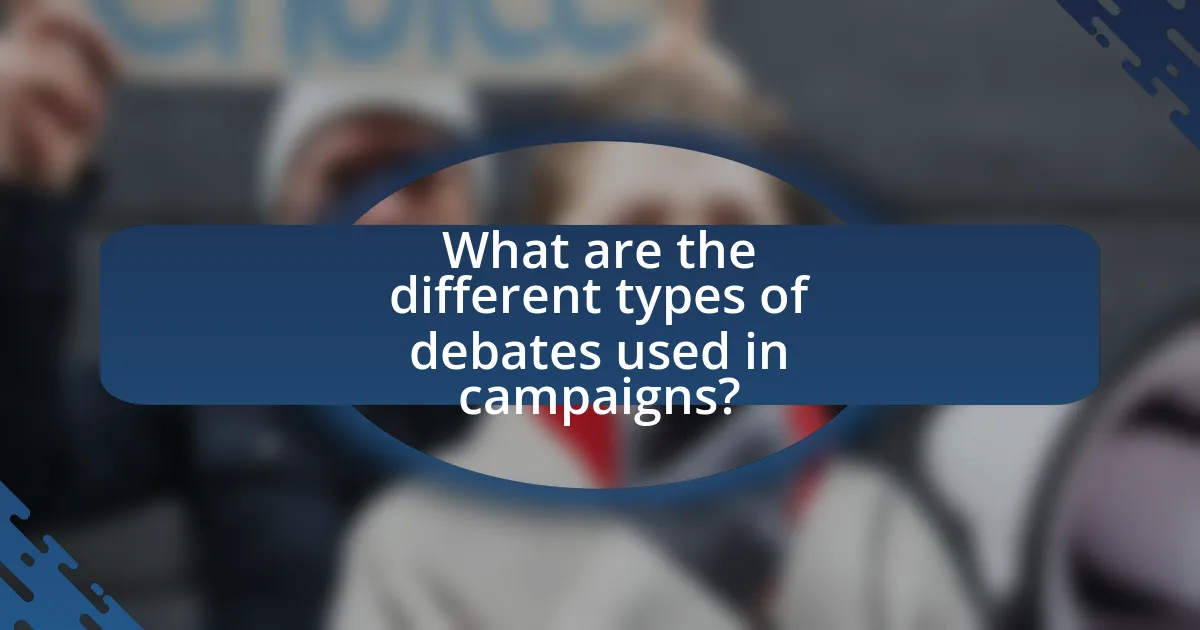
What are the different types of debates used in campaigns?
The different types of debates used in campaigns include formal debates, town hall debates, and online debates. Formal debates typically involve candidates presenting their positions on various issues in a structured format, often moderated by a third party, which allows for direct comparison of policies. Town hall debates engage candidates with voters in a more informal setting, encouraging interaction and addressing specific community concerns. Online debates leverage digital platforms to reach a broader audience, allowing for real-time engagement and participation. Each type of debate serves to enhance candidate visibility and clarify positions, ultimately influencing voter perceptions and decisions.
How do formats of debates vary across different political contexts?
Debate formats vary significantly across different political contexts, influenced by cultural norms, electoral systems, and the political landscape. For instance, in the United States, presidential debates typically follow a structured format with time limits and specific topics, fostering direct comparisons between candidates. In contrast, parliamentary systems, such as those in the United Kingdom, often feature more spontaneous exchanges and rebuttals, reflecting the adversarial nature of parliamentary debate. Additionally, in authoritarian regimes, debates may be heavily controlled or absent altogether, limiting genuine discourse and often serving as propaganda tools. These variations illustrate how the political environment shapes the structure and purpose of debates, impacting their effectiveness in shaping campaign strategies.
What are the pros and cons of each debate format?
The pros and cons of each debate format vary significantly. For instance, in a Lincoln-Douglas debate format, the pros include a focus on values and ethics, allowing for deep philosophical discussions, while the cons involve limited participant interaction, which can restrict the flow of ideas. In contrast, a Policy debate format promotes extensive research and evidence-based arguments, enhancing the depth of discussion; however, it can become overly technical, alienating general audiences. Furthermore, Town Hall debates encourage direct voter engagement and spontaneity, but they may lack structure, leading to less substantive discourse. Each format thus presents unique advantages and disadvantages that influence the effectiveness of debates in shaping campaign strategies.
How does the audience’s role change depending on the debate format?
The audience’s role changes significantly depending on the debate format, influencing their level of engagement and impact on the debate’s outcome. In formats like town hall debates, the audience actively participates by asking questions, which can shift the focus of the debate and reflect public concerns. Conversely, in traditional formats, the audience’s role is more passive, primarily serving as observers who react to the candidates’ performances without direct interaction. This distinction is crucial, as studies show that audience engagement can enhance the perceived authenticity of candidates, thereby affecting voter perceptions and campaign strategies.
What role do moderators play in shaping the debate experience?
Moderators play a crucial role in shaping the debate experience by facilitating the discussion, ensuring fairness, and guiding the flow of conversation. They set the tone for the debate, establish rules, and manage time, which directly influences how candidates present their arguments and interact with each other. For instance, a study by the Pew Research Center found that effective moderation can lead to more substantive exchanges and a clearer understanding of candidates’ positions, thereby enhancing audience engagement and perception of the debate.
How can moderators influence the direction of a debate?
Moderators can influence the direction of a debate by controlling the flow of conversation and determining the topics discussed. They set the agenda through the questions they pose, which can steer participants toward specific issues or away from others. For instance, a moderator who emphasizes economic policy may lead candidates to focus their arguments on that topic, thereby shaping the audience’s perception of priorities. Research indicates that moderators’ framing of questions can significantly impact the responses and the overall narrative of the debate, as seen in studies analyzing televised debates where moderators’ interventions led to shifts in candidate focus and public opinion.
What qualities make an effective debate moderator?
An effective debate moderator possesses impartiality, strong communication skills, and the ability to manage time efficiently. Impartiality ensures that the moderator treats all participants equally, fostering a fair environment for discussion. Strong communication skills enable the moderator to articulate questions clearly and facilitate dialogue among candidates, which is crucial for maintaining audience engagement. Efficient time management allows the moderator to keep the debate on track, ensuring that all topics are covered within the allotted time. These qualities are essential for creating a balanced and informative debate that can influence campaign strategies.
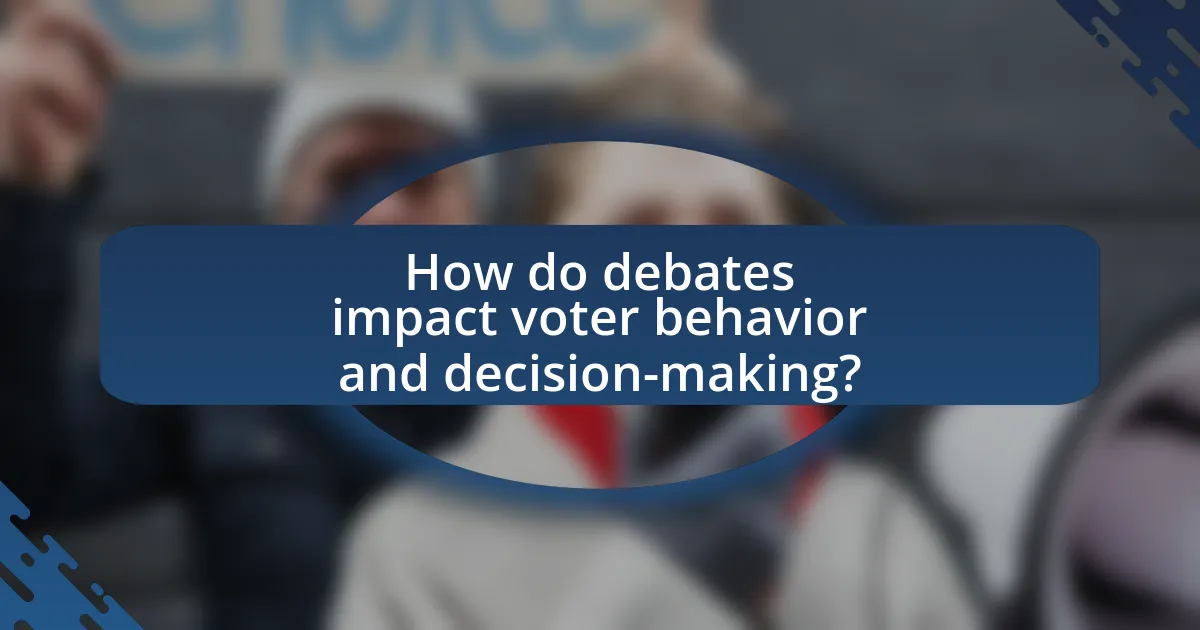
How do debates impact voter behavior and decision-making?
Debates significantly influence voter behavior and decision-making by providing a platform for candidates to present their policies and engage directly with opponents. This direct interaction allows voters to assess candidates’ communication skills, knowledge, and ability to handle pressure, which can sway their opinions. Research indicates that approximately 70% of voters report that debates help them make more informed choices, as they can compare candidates side-by-side on critical issues. Furthermore, debates can shift public opinion; for instance, a study by the Pew Research Center found that 40% of viewers changed their candidate preference after watching a debate, highlighting the debates’ role in shaping electoral outcomes.
What psychological effects do debates have on voters?
Debates significantly influence voters’ psychological states by shaping their perceptions and attitudes toward candidates. Research indicates that debates can enhance voter engagement, leading to increased interest in political issues and candidates. For instance, a study by the Pew Research Center found that 62% of debate viewers reported feeling more informed about the candidates’ positions after watching a debate. Additionally, debates can reinforce existing biases, as voters often interpret candidates’ performances through the lens of their pre-existing beliefs, which can solidify their support for a particular candidate. This phenomenon is supported by the concept of confirmation bias, where individuals favor information that confirms their preconceptions. Overall, debates serve as critical moments that can alter voter sentiment and decision-making processes.
How do debates affect undecided voters compared to committed supporters?
Debates significantly influence undecided voters more than committed supporters. Undecided voters often seek clarity and differentiation between candidates during debates, which can sway their opinions based on performance, arguments, and presentation. Research indicates that approximately 40% of undecided voters change their preferences after watching a debate, as they are more receptive to new information and persuasive rhetoric. In contrast, committed supporters are generally less influenced by debate performances, as their loyalty is rooted in prior beliefs and emotional connections to their chosen candidate. This dynamic highlights the strategic importance of debates in targeting undecided voters, who are crucial for electoral outcomes.
What role does media coverage play in shaping voter perceptions post-debate?
Media coverage significantly influences voter perceptions post-debate by framing candidates’ performances and highlighting key issues. This framing can affect public opinion, as studies show that media narratives often shape how voters interpret debate outcomes. For instance, a Pew Research Center study found that 63% of viewers reported that media coverage impacted their views on candidates after a debate. Additionally, the tone and focus of media reports can amplify certain messages, leading to shifts in voter sentiment and potentially altering campaign strategies.
How can candidates leverage debate performances to enhance their campaign strategies?
Candidates can leverage debate performances to enhance their campaign strategies by using them as platforms to showcase their policies, connect with voters, and differentiate themselves from opponents. Effective debate performances can increase a candidate’s visibility and credibility, as evidenced by the 2016 U.S. presidential debates, where candidates like Donald Trump and Hillary Clinton used their performances to solidify their positions and sway undecided voters. Additionally, candidates can analyze debate feedback and media coverage to refine their messaging and address voter concerns, ultimately shaping their campaign narratives to resonate more effectively with the electorate.
What strategies can candidates employ to recover from a poor debate performance?
Candidates can recover from a poor debate performance by engaging in immediate self-reflection and seeking constructive feedback. Self-reflection allows candidates to identify specific areas of weakness, such as communication style or argument clarity, which can be addressed in future engagements. Seeking feedback from trusted advisors or debate coaches provides external perspectives that can highlight blind spots and suggest improvements.
Additionally, candidates should focus on enhancing their public relations strategy by addressing the debate performance openly, acknowledging any missteps, and outlining steps for improvement. This transparency can help rebuild trust with voters. Furthermore, candidates can increase their visibility through follow-up events, interviews, or social media engagement, where they can reinforce their key messages and demonstrate growth.
Research indicates that candidates who effectively manage post-debate narratives can recover lost support; for instance, a study by the Pew Research Center found that candidates who openly addressed their debate shortcomings often regained favor among undecided voters.
How can successful debate performances be utilized in subsequent campaign messaging?
Successful debate performances can be utilized in subsequent campaign messaging by highlighting key arguments and showcasing the candidate’s strengths. Campaign teams can extract memorable quotes and impactful moments from debates to create compelling advertisements and social media content. For instance, after the 2012 presidential debates, Barack Obama’s campaign effectively used his strong rebuttals against Mitt Romney in ads, reinforcing his leadership image and resonating with voters. This strategy not only capitalizes on the candidate’s debate success but also helps to frame the narrative in favor of the candidate, making it easier to connect with the electorate.
What best practices should candidates follow to prepare for debates?
Candidates should follow several best practices to prepare for debates, including thorough research on key issues, understanding their opponent’s positions, and practicing responses to potential questions. Researching key issues allows candidates to present informed arguments, while understanding opponents’ positions helps in anticipating counterarguments. Practicing responses enhances confidence and delivery, which is crucial for effective communication during the debate. Additionally, reviewing past debates can provide insights into successful strategies and common pitfalls, further refining a candidate’s approach.
How can candidates effectively research their opponents before a debate?
Candidates can effectively research their opponents before a debate by analyzing their public statements, past debate performances, and policy positions. This involves reviewing transcripts of previous speeches and debates to identify key themes and weaknesses in their arguments. Additionally, candidates should examine their opponents’ social media activity and press releases to understand their current messaging and priorities. Fact-checking organizations can provide insights into the accuracy of opponents’ claims, which can be leveraged during the debate. By gathering this information, candidates can anticipate their opponents’ strategies and prepare counterarguments, ultimately enhancing their own debate performance.
What techniques can candidates use to practice and refine their debate skills?
Candidates can practice and refine their debate skills through techniques such as participating in mock debates, analyzing past debates, and receiving feedback from peers or coaches. Mock debates simulate real debate conditions, allowing candidates to practice their arguments and responses in a controlled environment. Analyzing past debates helps candidates understand effective strategies and common pitfalls, while feedback from peers or coaches provides constructive criticism that can enhance performance. Research indicates that deliberate practice, including these techniques, significantly improves debate skills and overall communication effectiveness.
